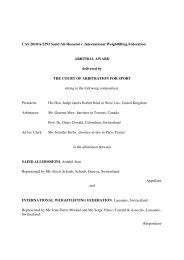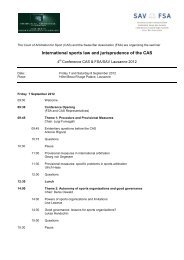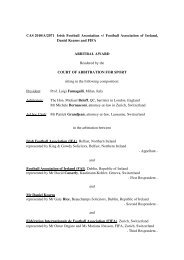(CAS) Bulletin - Tribunal Arbitral du Sport / TAS
(CAS) Bulletin - Tribunal Arbitral du Sport / TAS
(CAS) Bulletin - Tribunal Arbitral du Sport / TAS
Create successful ePaper yourself
Turn your PDF publications into a flip-book with our unique Google optimized e-Paper software.
epresentative (Respondent) argued that the case<br />
should not be admissible because the parties’ names<br />
were translated into English (instead of Dutch). The<br />
Panel rejected this argument because the language<br />
that had been chosen for the proceedings before<br />
the <strong>CAS</strong> was English. It found that it is perfectly<br />
admissible to translate the names of the parties into<br />
the language of the proceedings. Moreover, both<br />
Appellants used the English denomination in their<br />
respective Statement of Appeal and Appeal Brief.<br />
What is more, the Respondent was fully aware of the<br />
entities that were translated into English, and their<br />
identity was at no time doubtful.<br />
The Panel concluded that using the exact English<br />
translation of the Appellants was not capable of<br />
causing any confusion and that his right of defense<br />
was not endangered therethrough. In any event, in<br />
order to facilitate the cooperation with the <strong>CAS</strong>, the<br />
Panel requested the Appellants to use the original,<br />
non-translated (i.e. Dutch) names. On another front,<br />
the same Respondent argued that the fact that the<br />
Appellants’ names were translated into English<br />
(instead of Dutch) resulted in the appeal being fi led<br />
late. However, the Panel found that the denomination<br />
in English or in Dutch did not infl uence the existence<br />
or identity of the parties, and therefore the appeals<br />
were fi led timely.<br />
3. Modifi cation of the appointment of an arbitrator<br />
The decision of the President of the – ordinary or<br />
appeals – Division as to the language of the proce<strong>du</strong>re<br />
might affect the appointment of an arbitrator by one<br />
of the parties. This was the case in <strong>TAS</strong> 2005/A/983<br />
& 984 (order on language of 23 December 2005); the<br />
dispute concerned a football club from a Spanishspeaking<br />
country (the Appellant) and a French football<br />
club (the Respondent). The decision appealed against<br />
was drafted in Spanish and, while the Appellant fi led<br />
his statement of appeal in French, it appointed an<br />
arbitrator who could not con<strong>du</strong>ct an arbitration in<br />
French; the President of the Appeals Division held<br />
that in the absence of agreement between the parties<br />
it was not possible to choose Spanish as the language<br />
of the arbitration and opted for French. As a result,<br />
the President ordered that the initially appointed<br />
arbitrator (who could not con<strong>du</strong>ct the arbitration<br />
in French) should be replaced by another Frenchspeaking<br />
arbitrator and granted the Appellant with<br />
an additional deadline in order to appoint a new<br />
arbitrator of his choice and to submit the translations<br />
of all relevant documents into French 44 .<br />
44. See also <strong>CAS</strong> 2012/A/2722 & <strong>CAS</strong> 2012/A/2723, Orders on<br />
language of 29 February 2012, where the arbitrator that had initially<br />
been appointed did not speak English, the language eventually chosen<br />
for the proce<strong>du</strong>re, and was subsequently replaced.<br />
III. Final remarks<br />
Parties bringing their dispute before <strong>CAS</strong> may choose<br />
among the two “ offi cial ” <strong>CAS</strong> languages i.e. English<br />
and French, which are also the offi cial languages of<br />
the IOC which created the <strong>CAS</strong> back in 1984. If,<br />
however, the parties cannot reach an agreement as<br />
to the language of the proce<strong>du</strong>re, the case has to be<br />
brought to the President of the panel or the President<br />
of the Division who will decide which of the two<br />
languages shall be used, in most cases by means of an<br />
“ order on language ”. This has to be made at the outset<br />
of the proceedings, but issues related to language can<br />
also arise at a later stage.<br />
Specifi cally for the appeal proceedings, one should<br />
differentiate between the <strong>CAS</strong> working languages<br />
and the offi cial languages of a Federation/association<br />
that issued the fi rst-instance decision. Indeed, the<br />
language of the fi rst-instance proceedings (and the<br />
decision appealed against) may be a criterion in order<br />
to decide which language will be used before <strong>CAS</strong>;<br />
this, however, is not the case if the fi rst-instance<br />
proceedings took place in a third language. Another<br />
criterion determining the language of the proceedings<br />
is the language in which it was drafted the contract<br />
or agreement, in particular when the latter forms the<br />
subject matter of the dispute. Generally, however, the<br />
citizenship and the mother tongue of the Appellant<br />
(or one of the parties) do not constitute key elements<br />
regarding the choice of the language of arbitration,<br />
whereas proceedings before <strong>CAS</strong> may be con<strong>du</strong>cted<br />
in a language which may not necessarily be the one of<br />
the country of the Appellant/ one of the parties. The<br />
fact that the appellant or one of the parties or their<br />
counsel has not a good command in English is not a<br />
decisive element either.<br />
In some cases, although there is only one “ offi cial ”<br />
language chosen by the President of the relevant<br />
Division of <strong>CAS</strong>, the parties are allowed to bring<br />
their documents in another language without having<br />
to translate them or can express themselves orally in<br />
another language (when the appointed Arbitrators<br />
have a good command in both languages chosen). In<br />
any event, documents sent in another language than<br />
the language of the proce<strong>du</strong>re are not automatically<br />
declared inadmissible, but parties are granted a<br />
deadline in order to complete or translate their request<br />
(in order to avoid the excessive formalism according<br />
with the jurisprudence of the Swiss Federal <strong>Tribunal</strong>).<br />
<strong>CAS</strong> Panels show fl exibility in order to satisfy both<br />
parties and not encumber the proce<strong>du</strong>re, but always<br />
within the limits of <strong>du</strong>e process.<br />
It follows that the choice of a language of proce<strong>du</strong>re<br />
should not be underestimated; although, at fi rst<br />
Articles et commentaires / Articles and commentaries<br />
-<br />
46





